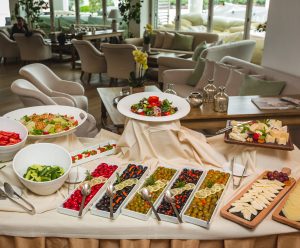In recent years, corporate events, weddings, and private gatherings have seen a growing emphasis on health-conscious and wellness-focused catering. Guests no longer view catering merely as a meal service; they expect nutritionally balanced, wholesome, and thoughtfully curated menus that align with their lifestyle choices.
Wellness-oriented catering combines culinary innovation, nutrition, and presentation to deliver an experience that satisfies both the palate and the body. It goes beyond calorie counting or trendy diets; it encompasses plant-based options, gluten-free dishes, organic ingredients, functional beverages, and allergen-friendly meals, ensuring every guest feels included and cared for.
This article explores the importance, trends, strategies, and practical tips for implementing healthy and wellness-oriented catering options for events of all sizes.
1. Understanding Wellness-Oriented Catering
Wellness-oriented catering focuses on nutrient-dense foods, mindful preparation, and holistic guest experiences.
1.1 Core Principles
- Nutrition First: Menus are designed to offer essential vitamins, minerals, and macronutrients.
- Balance: Meals combine proteins, carbohydrates, healthy fats, and fiber.
- Sustainability: Emphasis on locally sourced, seasonal ingredients reduces environmental impact.
- Inclusivity: Catering options accommodate dietary preferences such as vegan, vegetarian, gluten-free, keto, and halal.
1.2 Benefits for Guests and Hosts
- Enhances energy levels and focus during corporate events or workshops.
- Reflects care and attention to guests’ wellbeing, reinforcing brand reputation or personal hospitality.
- Encourages mindfulness about healthy eating habits in social and professional settings.
Case Example: A corporate wellness workshop in Dubai included a plant-based, nutrient-rich menu. Participants reported higher engagement and satisfaction, associating the event with wellness and innovation.
2. Popular Healthy Catering Options
Modern healthy catering includes diverse, flavorful, and visually appealing dishes.
2.1 Plant-Based Menus
- Emphasizes vegetables, legumes, whole grains, nuts, and seeds.
- Popular items include quinoa salads, chickpea stews, roasted vegetable platters, and vegan sushi.
- Plant-based menus cater to health-conscious guests while aligning with sustainability goals.
2.2 Low-Calorie & Balanced Meals
- Focus on portion control and nutrient balance without compromising flavor.
- Includes grilled proteins, roasted vegetables, and wholesome grains.
- Offers variety while promoting a lighter, more digestible dining experience.
2.3 Gluten-Free & Allergen-Friendly Options
- Gluten-free, dairy-free, and nut-free dishes ensure inclusivity.
- Prevents health-related incidents while accommodating dietary preferences.
- Example: Gluten-free quinoa bowls with roasted vegetables, tahini dressing, and protein toppings.
2.4 Functional Foods & Beverages
- Incorporates ingredients with health benefits: antioxidants, probiotics, omega-3 fatty acids.
- Functional beverages include herbal teas, smoothies, kombucha, and immunity-boosting drinks.
- Example: A “wellness bar” offering turmeric lattes, detox juices, and herbal infusions during corporate retreats.
3. Trends in Wellness-Oriented Catering
3.1 Mindful Eating Experiences
- Guests are encouraged to savor flavors and textures rather than rush through meals.
- Portioned tasting menus, interactive salad bars, or build-your-own bowls promote mindful consumption.
3.2 Locally Sourced & Organic Ingredients
- Locally grown produce is fresher, nutrient-rich, and sustainable.
- Organic ingredients ensure fewer pesticides, supporting health and environmental responsibility.
3.3 Plant-Based and Flexitarian Options
- Flexitarian menus combine plant-based dishes with moderate portions of lean proteins.
- Reduces environmental impact while providing balanced nutrition for omnivorous guests.
3.4 Global Health-Inspired Cuisines
- Mediterranean, Japanese, and Middle Eastern cuisines are trending due to their healthful ingredients and flavor profiles.
- Example: Hummus, tabbouleh, sushi rolls, and miso soup as catering staples.
3.5 Personalized Wellness Packages
- Catering services offer customizable options for VIP guests or employees with specific dietary needs.
- Nutritional profiling helps design menus that support energy, focus, and overall wellbeing.
4. Designing a Healthy Catering Menu
4.1 Balanced Meal Composition
- Each meal should include:
- Lean protein (chicken, fish, tofu, legumes)
- Complex carbohydrates (quinoa, brown rice, whole grains)
- Healthy fats (avocado, nuts, olive oil)
- Fiber-rich vegetables and fruits
4.2 Menu Variety & Guest Inclusion
- Include vegetarian, vegan, and gluten-free options.
- Incorporate seasonal and local ingredients for freshness and cost-effectiveness.
- Example: Event menus in Abu Dhabi often combine Middle Eastern mezze, grain bowls, and fresh fruit platters for a balanced, wellness-focused offering.
4.3 Flavorful Without Excess Salt or Sugar
- Use herbs, spices, and natural flavor enhancers instead of excessive salt, sugar, or processed sauces.
- Infused oils, citrus, and fermented foods enhance taste while supporting digestion and metabolism.
4.4 Interactive Food Stations
- “Build-your-own” stations allow guests to customize meals to personal taste and dietary needs.
- Examples:
- Salad bars with diverse toppings
- Grain and protein bowls with multiple dressings
- Smoothie or juice stations with fresh ingredients
5. Beverage Options for Wellness-Focused Catering
5.1 Functional Beverages
- Kombucha, green tea, infused water, and herbal teas are popular choices.
- Include immunity-boosting drinks with turmeric, ginger, or lemon.
5.2 Low-Sugar & Natural Ingredients
- Avoid artificial sweeteners; use honey, agave, or natural fruit juices.
- Offer hydration options with electrolytes for corporate or outdoor events.
5.3 Signature Wellness Drinks
- Branded smoothies, detox juices, or fresh coconut water add a personalized touch.
- Encourages social sharing and enhances brand visibility for corporate events.
6. Catering Styles for Wellness-Oriented Events
6.1 Buffet Style
- Guests serve themselves, controlling portions and mixing dishes according to preferences.
- Offers a variety of wellness options without extensive staff or high costs.
6.2 Plated Service
- Perfect for formal events with curated, nutritionally balanced meals.
- Allows controlled portion sizes and precise presentation.
6.3 Interactive & Live Stations
- Guests engage with chefs, selecting fresh ingredients for customized meals.
- Enhances experience, encourages mindful eating, and adds a visual appeal to wellness catering.
7. Wellness Catering for Corporate Events
Corporate wellness catering not only promotes health but also reflects company values.
7.1 Employee Engagement
- Offering healthy meals at workshops, conferences, or retreats improves focus, energy, and morale.
- Reflects a company’s commitment to employee wellbeing, fostering loyalty and productivity.
7.2 Client Impressions
- Hosting clients with nutritionally balanced and aesthetically appealing meals communicates attention to detail and professionalism.
- Demonstrates that the company values the health and comfort of its stakeholders.
7.3 Sustainability Integration
- Eco-friendly practices such as reusable serviceware, locally sourced ingredients, and minimal waste enhance corporate social responsibility messaging.
Example: A Dubai-based corporate event served a plant-based buffet with compostable plates, showcasing the company’s wellness and sustainability priorities.
8. Dietary Inclusion and Diversity
Wellness-oriented catering ensures no guest is left out.
8.1 Vegan and Vegetarian Options
- Plant-based proteins like lentils, chickpeas, tofu, and tempeh ensure high-protein meals without animal products.
8.2 Gluten-Free & Allergy-Sensitive Meals
- Essential for guests with celiac disease, lactose intolerance, or nut allergies.
- Avoid cross-contamination for safety and trust.
8.3 Halal and Kosher-Friendly Menus
- Especially important for events in multicultural regions like the UAE, ensuring inclusivity and respect for dietary laws.
9. Presentation & Styling for Wellness Catering
Presentation enhances guest perception, making healthy meals feel indulgent.
9.1 Colorful Platters
- Use a variety of vegetables, fruits, and grains to create visually appealing dishes.
9.2 Portion Control with Elegance
- Mini-bowls, tasting plates, and neatly plated entrees offer aesthetic appeal and encourage mindful eating.
9.3 Interactive Displays
- Salad bars, smoothie stations, and juice counters act as both functional service and visual décor.
10. Technology in Wellness-Oriented Catering
10.1 Menu Customization Apps
- Guests can select ingredients based on dietary preferences in advance.
10.2 QR Code Nutrition Labels
- Allows guests to see calorie counts, macros, and allergen information easily.
10.3 Event Management Tools
- Streamline orders, track RSVPs, and monitor guest dietary needs for seamless catering execution.
11. Sustainability and Ethical Practices
Healthy catering is closely linked to sustainability:
- Reduce food waste with careful portion planning.
- Use biodegradable packaging or reusable serveware.
- Source local, seasonal, and organic ingredients.
- Example: UAE events often feature locally grown organic vegetables and seasonal fruits, reflecting wellness and environmental consciousness.
12. Case Studies of Successful Wellness Catering
12.1 Corporate Wellness Retreat, Dubai
- Served plant-based meals, fresh juices, and detox drinks.
- Interactive salad bars encouraged guest participation.
- Result: High engagement and positive feedback on health-focused catering.
12.2 Wedding with Wellness Focus
- Gluten-free desserts, vegetarian entrees, and organic cocktails.
- Beautiful presentation and themed wellness stations enhanced guest experience.
12.3 Conference Event, Abu Dhabi
- Balanced menus for diverse dietary needs.
- Branded hydration stations and smoothies promoted energy and focus.
- Guests associated the company with care, professionalism, and health-conscious values.
13. Planning Tips for Wellness-Oriented Catering
- Know Your Guests: Collect dietary preferences in advance.
- Focus on Seasonal Ingredients: Fresh, nutritious, and cost-effective.
- Incorporate Variety: Include proteins, grains, vegetables, and fruits.
- Balance Flavor and Nutrition: Avoid sacrificing taste for health.
- Consider Sustainability: Eco-friendly practices enhance wellness messaging.
- Interactive Stations: Encourage engagement and mindful eating.
- Professional Staff Training: Ensure knowledgeable servers can guide guests.
14. Challenges in Wellness Catering and How to Overcome Them
14.1 Guest Acceptance
- Some guests may be skeptical about plant-based or low-calorie meals.
- Solution: Flavorful presentation, creative plating, and familiar dishes can encourage acceptance.
14.2 Cost Considerations
- Specialty ingredients may increase cost.
- Solution: Focus on seasonal, locally sourced ingredients and balance high-cost items with budget-friendly options.
14.3 Dietary Complexity
- Managing multiple dietary requirements can be challenging.
- Solution: Use technology for tracking preferences and design a diverse yet manageable menu.
15. Future Trends in Wellness Catering
- Personalized Nutrition: Catering designed for individual guest health goals.
- Functional Beverages: Emphasis on probiotics, antioxidants, and immunity boosters.
- Plant-Based Innovations: Creative uses of legumes, seeds, and alternative proteins.
- Eco-Conscious Packaging: Biodegradable and reusable serving materials.
- Technology Integration: Digital menus, QR codes, and dietary tracking.
These trends indicate that wellness catering will continue to shape guest expectations and event standards globally.
Conclusion: Wellness Catering as a Game-Changer
Healthy and wellness-oriented catering is more than a trend—it’s a transformative approach that combines nutrition, aesthetics, sustainability, and guest experience. Whether for corporate events, weddings, or private gatherings, wellness-focused menus reflect care, professionalism, and inclusivity, leaving a lasting impression on all attendees.
By thoughtfully integrating plant-based dishes, functional beverages, allergen-sensitive options, and sustainable practices, caterers can elevate events while prioritizing the health and satisfaction of every guest. Wellness-oriented catering not only enhances events but also positions hosts as innovative, socially conscious, and attentive, creating memorable experiences that guests will associate with both enjoyment and wellbeing.






